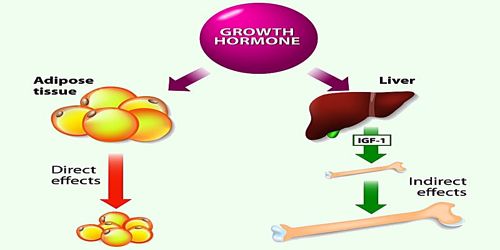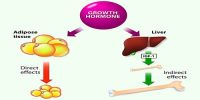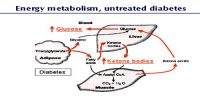“Growth hormone has both Diabetogenic and Ketogenic effect”
Growth hormone encourages growth and development in children and adolescents. The major role of growth hormone in stimulating body growth is to stimulate the liver. It also helps to control body composition, body fluids, muscle and bone growth, sugar and fat metabolism, and perhaps heart function.
Synthesis: Growth hormone is synthesized by acidophilic cells of the anterior, pituitary gland.
Chemistry: Unbranched polypeptide chain. It contains 191 amino acids. Molecular weight is 22,005.
Blood Level: Basal plasma conc. of GH 0-3 ng/m1 in adults.
Daily secretion: 0.4 mg/day.
Ketogenic effect
- Adipose tissue → Mobilization by GH
- Fatty acid
- FFA in circulation → Metabolized by liver
- Acetyl-CoA → Converted by the liver
- Acetoacetic acid → β-OH butyrate
- Released into the blood.
Under the influence of GH, fat mobilization from adipose tissue sometimes becomes so great that large quantities of acetoacetic acid are released into the blood causing ‘ketosis’.
There are the reasons why GH is said to ketogenic.
Ketu acids are- Acetoacetic acid, β-hydroxybutyrate, Acetone.
Diabetogenic effect of GH
GH Causes
Diminished uptake of glucose by the cells.
Thus, GH increases blood glucose concentration.
Now,
- ↑ Blood glucose (maybe 50x more than normal)
- Caused by GH
- Excess stimulation of β-cells of the islet of Langerhans of the pancreas ↓
- Extra insulin
- Now, these over stimulations can burn out β-cells,
- No insulin output farther: DM
That is why GH is diabetogenic. This diabetic is called Pituitary diabetes. It is insulin insensitive.















